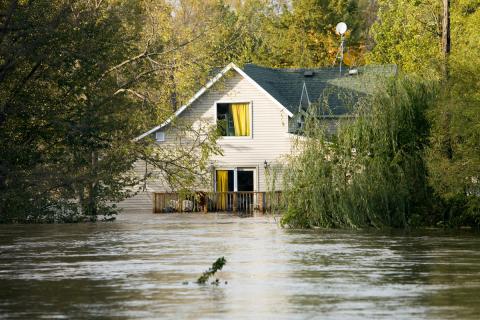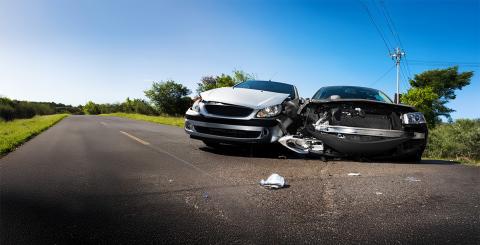What to do if you hit an animal with your car

Hitting an animal with your car is a terrible experience that can happen any time of year. Many of the vehicle accidents that happen on Québec’s roads involve wildlife or domesticated animals. Not only are these accidents traumatic, they can also cause injuries and serious damage.
So what should you do if you hit an animal with your car? And how is it different from hitting a random object? Does your car insurance cover collisions with animals? How can you adjust your driving habits to reduce the risk of such collisions? Let’s go over it step-by-step.
Animal–vehicle collisions: One step at a timeIt would be great if it never happened. But the fact is, anyone can wind up hitting an animal. Although there are high-risk places and times of year, there is always a certain probability that you’ll encounter an animal on the road. If you hit an animal, read the following carefully to find out what to do.
Find a safe place and check for injuries
The first thing to do is to find a safe place, away from the animal, and stop your vehicle there to check that everyone is OK. A collision with a big or heavy animal and the sudden braking that precedes it can cause serious injuries. The impact is even greater in the case of head-on collisions.
Don’t approach the animal
Stay well away from an animal you’ve run into with your car. If it’s alive and injured, it’s likely to be panicky and dangerous. Let emergency services get it off the road, if necessary.
Call emergency services
Call emergency services if someone is injured or if the animal is blocking the road. Éducaloi tells us that under the Highway Safety Code, you are required to report any collision with wildlife or a domesticated animal if it weighs more than 25 kilograms. An animal that size on the road can be a hazard for other drivers and lead to other accidents.
The penalty for failing to report is a fine of up to $300 and 9 demerit points on your driving record. With some animals, you can safely make assumptions about their weight (squirrels don’t need to be reported, and moose do) but if in doubt, it’s best to report the incident.
Good to know: According to Infoinsurance, there are over 7,000 large-animal collisions on Québec roads each year, most often involving white-tailed deer. November is the month with the highest risk of wildlife collisions.
Check if the animal is subject to mandatory reporting
Québec also has a list of declarable animals under an Act respecting the conservation and development of wildlife regulation. Any injury or death of any of the following animals must be reported to a wildlife protection officer:
- Mammals:
- Musk-ox
- Wolverine
- Caribou
- White-tailed deer
- Cougar
- Coyote
- Wolf
- Canadian lynx
- Bobcat
- Virginia opossum
- Moose
- Polar bear
- Black bear
- Grey fox
- Birds:
- Wild turkey
- All diurnal and nocturnal birds of prey
If you hit a domesticated animal
If you hit a domesticated animal, such as a dog, see if its owners are around and if they need help. Remember that the rule about reporting accidents involving animals weighing more than 25 kg applies to domesticated animals too.
If another vehicle is involved
If another vehicle is involved, complete a joint report so the police can get all the necessary information and file a report as soon as possible.
Damage, injuries, and car insurance
It’s important to contact your insurer right away to let them know you were in a collision with an animal and get them your joint report and the police file number.
Physical damage
Will your car insurance cover you for the damage to your vehicle? You can be compensated for repairs to your vehicle, but only if you have one of the following policies:*
- Comprehensive coverage
- Collision and upset coverage
- Coverage for perils other than collision or upset
In those circumstances, you’ll have to pay the deductible listed in your insurance policy. If you don’t have third-party liability coverage, your car insurance won’t cover you for the damage.
Good to know: If your car insurance doesn’t cover the damage to your vehicle, you can try to sue the pet owner. Under the law, pet owners can be held liable for damages caused by their pet. Get legal advice if you need to go that route.
Personal injuries
SAAQ (Société de l’assurance automobile du Québec) steps in if you’ve been physically injured. SAAQ pays compensation to all victims, regardless of driver responsibility. To learn more about the process, contact SAAQ.
Prevention tips
Although accidents can happen to anyone, there are ways to reduce the risk of animal collisions. How? By always paying attention and driving defensively. Here are some ways to do that, courtesy of Québec’s Ministère des Transports:
- Watch for road signs to alert you to the danger of deer and moose collisions.
- Stay alert, watch for animals, and slow down in high-risk areas.
- If you see an animal by the side of the road, slow down and honk your horn. Watch carefully. Animals are often unpredictable and tend to go around in groups.
- Don’t swerve suddenly to avoid an animal at the last moment. It can lead to a more serious accident.
- Watch out on curves, slopes, stretches with vegetation beside the road, and anything else that might make it harder to see an animal.
- Be extra careful at sunrise and sunset and in June, July, October, and November.
Now you know how to reduce the risk of hitting an animal with your car. If it happens all the same, just follow the instructions above and stay as calm as possible. For your peace of mind, you should also have car insurance that meets your needs. Ask for a car insurance quote from Promutuel Insurance. By comparing quotes, you’ll find the best insurance for your needs.
*Some exclusions may apply, as stated in the insurance policy.




